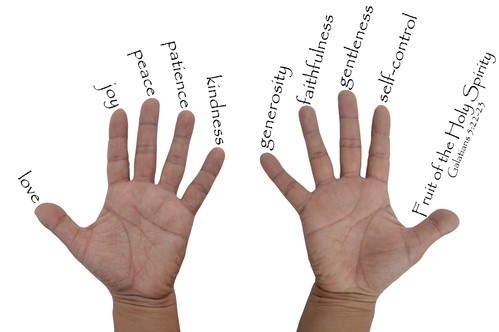Produce Fruit
Click the picture for audio
By Ann Swenson
“I am the vine; you are the branches. If you remain in me and I in you, you will bear much fruit; apart from me you can do nothing” (John 15:5). What does it actually mean to produce fruit?
I pulled into the driveway as the dust rolled behind me from the dry dirt road and mixed with the smoke from the fires in Canada. Through the clouds I stared in disbelief at my two apple trees. What? Could it be possible that BOTH of my apple trees were flowering at the same time? I squinted to see if what I was seeing was true.
My family and I planted these two little trees a few years back, and over those years, I think it is safe to say that we’ve produced only about two dozen apples total. One year, one tree blossoms, and in the next year, the other tree blossoms. Some years, like last, neither blossomed...no apples. Why hadn’t they produced fruit?
I know it takes time. It seems to me that if you plant a tree, if you water it, and if you prune the branches when necessary--indeed, you’ve done everything right for the apples to start to grow. I’ve watched the bees in hope that they’re spreading pollen all over the leaves with their fuzzy little bodies.
Every year, I think that I must have done something wrong the year before to once again not get the bumper crop that I see at the annual autumn trip to the orchard. Until this year, never have I seen both trees blossom with so many tender white petals! Could it be that this is the year we have two trees drooping with the weight of fruit? I hope so!
God teaches us lessons to bless our lives in the least expected ways and places sometimes. A part of the mission of Vine and Branches Stories is that the stories shared will produce fruit in the same way that I hope that my apple trees will soon do.
God has that same hope for each of us as I do for those two apple trees; He wants us to produce fruit, and He explains this throughout the Bible.
As a response to misled missionaries who were trying to be hybrid Jews while also accepting Christ as their Messiah, the apostle Paul wrote to the Galatians urgently trying to prune (no pun intended) the lies that certain laws of Moses needed to be upheld. Specifically, he encouraged the church at Galatia to let go of the things that will only enslave and instead to grow in the areas that would help to mature them into the likeness of Christ.
Specifically, Paul lists these nine fruits that should be nurtured and cultivated into our very beings; in chapter 5 Paul says: “But the fruit of the Spirit is love, joy, peace, patience, kindness, goodness, faithfulness, gentleness, and self-control. Against such things, there is no law. Those who belong to Christ Jesus have crucified the flesh with its passions and desires. Since we live by the Spirit, let us keep in step with the Spirit” (v 22-25).
One of the ways we cultivate these fruits is to be filled with love for others. A few sentences before Paul lists the good fruit, he implores us to serve one another in love (13), and just a few sentences after that, he reminds us to bear each other’s burdens (6:2).
These parameters seem pretty straightforward, but so does growing apples. What does it look like to love each other and to have an abundance of patience and kindness? Water the tree, prune the tree…. and apples should grow, right? As I have witnessed with my own apple trees, even under the best circumstances, the fruit in some instances, won’t grow! It takes work, it takes study, and it takes investigation. It takes watching others and learning from their experiences, and it takes obedience to listen when God is nudging us towards something or away from something.
Not only do we have to have an understanding of what our expectations are, but we also have to nurture those attributes: to help them along. Reading and studying scripture not only lists out neatly the way we should behave and how our hearts should change, but it also gives us example after example of how to live that out.
That’s the part that takes time: we have to give ourselves some grace, and we have to keep working at it…the fruit will be ripe! We have to prune what we know doesn’t belong in our lives. We must water the fruit by remaining in joy in order to overflow that to others--to share that with others through our stories. Filling our watering cans with worship, prayer, and fellowship with others who are growing in the same orchard is what it takes.
So how does sharing our goodness-of-God story to others produce fruit? Sharing shows we are one with Jesus, and we have recognized His work in our lives. We knew that God orchestrated the goodness of what we are sharing with others, so we are able to lovingly share knowing that it could help someone else to see that God is actively working in our lives. Recognizing God’s goodness is fruit, but sharing will produce even more fruit.
He is our gardener, our pollinator, our pruner. Through Christ, we are growing to be loving, joyful, peace-filled, patient, kind, good, faithful, gentle, and well-practiced in self-control. The stories we have to share about God as He moves in our lives will show these attributes of Christ, but they will also show how those fruits of the spirit are ours, too.
Now it’s our turn to be the busy honey bees. It’s time to pass on what it takes to help others to turn to the Master Gardener and to start their own orchard of spiritual fruit.
What fruit will our stories produce? Our story may bring someone to Jesus for the first time. It may remind someone that they are ready to return to Him. Our stories might spark joy, could give someone an idea for a ministry, or might help someone out of a jam (puns are fun). Our stories might ease the mind of someone with an anxious spirit or a scary diagnosis, or they might help someone reconsider bad choices and to admit that they need help; so much good (fruit) can come from sharing our stories.
How can one believe if no one ever told them about Jesus? This is our opportunity to live out the great commission and not only to tell people but to show people that Christ is the Lord of our lives.
Paul asks the Romans “How, then, can they call on the one they have not believed in? And how can they believe in the one of whom they have not heard? And how can they hear without someone preaching to them? And how can anyone preach unless they are sent? As it is written: ‘How beautiful are the feet of those who bring good news!’” (Romans 10:14-15 NIV). Paul is saying we need discipleship--people to share stories of the good news.
“I am the vine; you are the branches. If you remain in me and I in you, you will bear much fruit; apart from me you can do nothing” (John 15:5). Together, we can cultivate Goodness-of-God stories. Our branches will be heavy with God’s blessings. They are there for the taking to anyone in need.
Which fruit (story) will you share when God next shows you His goodness?

Posted in Godly Messages
Posted in fruits of the spirit, NLC Story, Galatians 5:22-23, Stories, Fruit, NLC Stories
Posted in fruits of the spirit, NLC Story, Galatians 5:22-23, Stories, Fruit, NLC Stories

